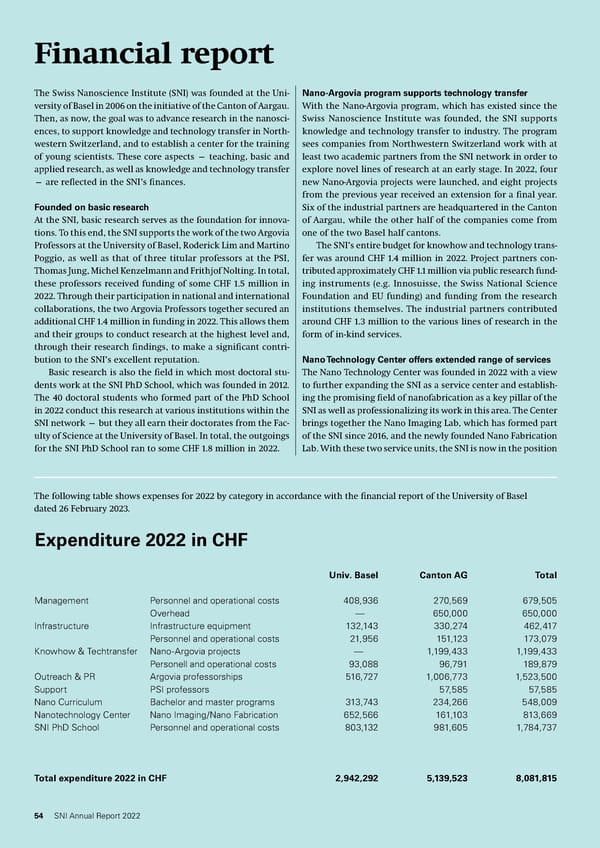Financial report The Swiss Nanoscience Institute (SNI) was founded at the Uni- Nano-Argovia program supports technology transfer versity of Basel in 2006 on the initiative of the Canton of Aargau. With the Nano-Argovia program, which has existed since the Then, as now, the goal was to advance research in the nanosci- Swiss Nanoscience Institute was founded, the SNI supports ences, to support knowledge and technology transfer in North- knowledge and technology transfer to industry. The program western Switzerland, and to establish a center for the training sees companies from Northwestern Switzerland work with at of young scientists. These core aspects — teaching, basic and least two academic partners from the SNI network in order to applied research, as well as knowledge and technology transfer explore novel lines of research at an early stage. In 2022, four — are reflected in the SNI’s finances. new Nano-Argovia projects were launched, and eight projects from the previous year received an extension for a final year. Founded on basic research Six of the industrial partners are headquartered in the Canton At the SNI, basic research serves as the foundation for innova- of Aargau, while the other half of the companies come from tions. To this end, the SNI supports the work of the two Argovia one of the two Basel half cantons. Professors at the University of Basel, Roderick Lim and Martino The SNI’s entire budget for knowhow and technology trans- Poggio, as well as that of three titular professors at the PSI, fer was around CHF 1.4 million in 2022. Project partners con- Thomas Jung, Michel Kenzelmann and Frithjof Nolting. In total, tributed approximately CHF 1.1 million via public research fund- these professors received funding of some CHF 1.5 million in ing instruments (e.g. Innosuisse, the Swiss National Science 2022. Through their participation in national and international Foundation and EU funding) and funding from the research collaborations, the two Argovia Professors together secured an institutions themselves. The industrial partners contributed additional CHF 1.4 million in funding in 2022. This allows them around CHF 1.3 million to the various lines of research in the and their groups to conduct research at the highest level and, form of in-kind services. through their research findings, to make a significant contri- bution to the SNI’s excellent reputation. Nano Technology Center offers extended range of services Basic research is also the field in which most doctoral stu- The Nano Technology Center was founded in 2022 with a view dents work at the SNI PhD School, which was founded in 2012. to further expanding the SNI as a service center and establish- The 40 doctoral students who formed part of the PhD School ing the promising field of nanofabrication as a key pillar of the in 2022 conduct this research at various institutions within the SNI as well as professionalizing its work in this area. The Center SNI network — but they all earn their doctorates from the Fac- brings together the Nano Imaging Lab, which has formed part ulty of Science at the University of Basel. In total, the outgoings of the SNI since 2016, and the newly founded Nano Fabrication for the SNI PhD School ran to some CHF 1.8 million in 2022. Lab. With these two service units, the SNI is now in the position The following table shows expenses for 2022 by category in accordance with the financial report of the University of Basel dated 26 February 2023. Expenditure 2022 in CHF Univ. Basel Canton AG Total Management Personnel and operational costs 408,936 270,569 679,505 Overhead — 650,000 650,000 Infrastructure Infrastructure equipment 132,143 330,274 462,417 Personnel and operational costs 21,956 151,123 173,079 Knowhow & Techtransfer Nano-Argovia projects — 1,199,433 1,199,433 Personell and operational costs 93,088 96,791 189,879 Outreach & PR Argovia professorships 516,727 1,006,773 1,523,500 Support PSI professors 57,585 57,585 Nano Curriculum Bachelor and master programs 313,743 234,266 548,009 Nanotechnology Center Nano Imaging/Nano Fabrication 652,566 161,103 813,669 SNI PhD School Personnel and operational costs 803,132 981,605 1,784,737 Total expenditure 2022 in CHF 2,942,292 5,139,523 8,081,815 54 SNI Annual Report 2022
 SNI Annual Report 2022 Page 53 Page 55
SNI Annual Report 2022 Page 53 Page 55